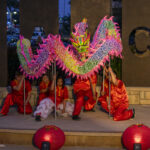
Asian American hate crimes have existed ever since Asian immigration. However, according to the Center for the Study of Hate and Extremism, hate crimes targeting Asian people increased by 150% in 2020.
Delaina Ashley Yaun Gonzalez, Paul Andre Michels, Xiaojie Tan, Daoyou Feng, Suncha Kim, Soon Chung Park and Yong Ae Yue lost their lives and Elcias Hernandez-Ortiz was severely injured after an active shooter walked into three Asian-owned spas on March 16 in the Atlanta area and shot nine people.
Authorities did not label this incident an anti-Asian hate crime. However, since six of the victims in this shooting were Asian-American women, the incident has led to a surge in conversations about anti-Asian hate crimes and the racism Asian Americans and Pacific Islanders (AAPI) experience.
Dr. Soojin Chung, assistant professor of intercultural studies, spoke about this rise.
“We are not making this up,” Chung said. “There are actual statistics out there that hate crimes are on the rise and specifically because of the harmful rhetoric of ‘China Virus’ and blaming the Asians.”
Leah Lowe, sophomore nursing student, stressed that Asian Americans have been experiencing hate crimes long before the pandemic.
“I am disheartened by the rising hate crimes,” Lowe said. “However, this does not necessarily mean that they didn’t exist before the pandemic. They are simply amplified due to increased incident reports and coverage of the media. We should not believe that they have only just started since COVID. Asian people have faced racial oppression since first coming to America.”
Jolene Automo, junior theater major, shared how she believes the community can help. Automo emphasized the need for discussion about the issue of anti-Asian hate.
“I think the best way the California Baptist University community can support and lift up AAPI peers is simply by having conversations,” Automo said. “Each and every member of the AAPI community has a completely different story on how they got here and what their lives looked like growing up. The best way you can help lift them up is being interested in their story and what they have to say.”
Automo expanded on this conversation by sharing about her own Asian American experience.
“I was born and raised in America,” Automo said. “My parents are from Indonesia and I would gladly talk about their experience on their behalf, but that is not all that I am. That is why I believe in the importance of listening to your AAPI peers and hearing their personal stories.”
Chung emphasized the importance of validation in these conversations.
“It is very important not to dismiss people’s experience when they confide in you,” Chung said. “Not only are Asian Americans hurting because of what happened, but they are also hurting because of people’s response. You are punching them twice by saying it is not about race, or ‘Do not be hypersensitive’ or ‘This is just one bad kid who had a bad day.”
Using her position as a professor, Chung said she has helped Asian American students through the grieving process. Many students have seen Chung and her experiences as an Asian American as a place to find comfort.
“A lot of my Asian American students emailed me directly because they did not know where to turn,” Chung said. “Not only are they dealing with sadness, but they are also dealing with fear. They feel unsafe to just go to a market because they feel like they are going to be verbally abused or even physically abused. That gave me a wake-up call that I am actually in a position of influence and I should address this issue and try to comfort my students.”
Chung said education can help highlight a rise in AAPI hate and display how people can approach the issue.
“I teach intercultural studies and how we communicate across different cultures,” Chung said. “This is a prime example of what can go wrong when we do not communicate well interculturally.”
Along with education, Automo said she believes Christianity and acceptance go hand-in-hand.
“We are all children of God,” Automo said. “That is who we are, that is our identity and if you truly believe that, then love on all your brothers and sisters around you through words and actions.”
Lowe shared her experience of growing up as an Asian American woman and struggling with acceptance.
“I have spent the majority of my life running away from my Asian-ness, trying to assimilate to white culture with the hopes of being accepted by my peers,” Lowe said. “Being an Asian woman, to me, represents the daily acceptance of the way God has made me with the knowledge that I was created in the likeness of him. This is my daily battle, choosing to unlearn the white beauty standards that have told me for so long that I am less than and therefore unworthy of love. Being Asian, to me, also means not shying away from my racial identity out of fear of hate but rather facing it head on.”


